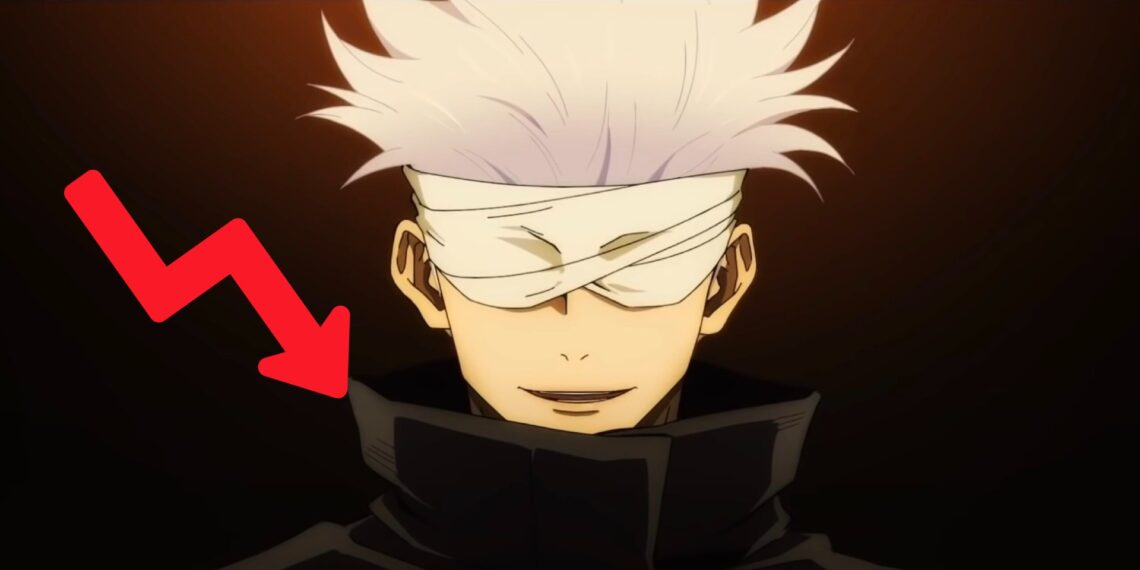The anime industry continues to grow substantially thanks to the global reach of streaming, making top-performing anime and manga in Japan more profitable than ever.
According to data released by Oricon tracking Japan’s top-selling franchises in 2023, Jujutsu Kaisen took third place with 4.94 billion yen (around $37 million).
This is an impressive earning for Jujutsu Kaisen, but it likely could have been even higher if not for issues with piracy and illegal streaming impacting revenues.
While long-running hit One Piece managed to retain its #1 spot for the year, up-and-coming series like Blue Lock and Oshi no Ko posted strong numbers on the back of new anime premieres and hit theme songs.
Jujutsu Kaisen comparably did not have major new content in 2023 besides a film, so its high placing demonstrates the continued popularity of the dark supernatural series.

However, illegal viewing of Jujutsu Kaisen remains a persistent problem that analysts estimate may have cost the franchise upwards of 50 billion yen ($370 million) in lost earnings for 2023 alone.
Curbing piracy could have boosted Jujutsu Kaisen’s profits substantially, potentially even making it the top earner of the year according to some projections. Nonetheless, Jujutsu Kaisen remains a top anime brand heading into 2024.
Piracy’s Impact on Jujutsu Kaisen and the Anime Industry’s Global Reach
Anime piracy has always been a prickly issue. In the past, fan translations helped introduce foreign fans to shows not officially available overseas.

But this accessibility came with a dark side – enabling widespread illegal viewing. For a hugely popular shonen series like Jujutsu Kaisen, the costs of piracy are staggering.
According to 2023 data, Jujutsu Kaisen earned an impressive 4.94 billion yen domestically in Japan. However, analysts estimate over 50 billion yen in losses globally from piracy.
This suggests the Jujutsu Kaisen franchise could have earned 10 times more if the illegal distribution had been curbed.

Availability gaps still drive some piracy. Yet illicit sites continue offering Jujutsu Kaisen for free, despite its presence on legal platforms like Crunchyroll.
The anime industry recognizes the dual-edged sword of fansubs’ legacy. But for Jujutsu Kaisen and other leading titles today, unchecked piracy seriously cuts into profits.

More accessible official options and anti-piracy actions are needed to unlock the true money-making potential of Jujutsu Kaisen and its ilk.
If piracy was reined in, Jujutsu Kaisen may have even dethroned One Piece as 2023’s top anime earner based on its gigantic lost revenues.

Looking ahead, getting control of unlawful distribution will be crucial for Jujutsu Kaisen and others to fully capitalize on the exploding worldwide demand for anime. This remains an urgent but surmountable challenge.
The Evolution of Anime Accessibility and the Lingering Shadow of Piracy
The situation around accessing anime has changed a lot over time. Nowadays, availability is not as big of an issue.

Major streaming platforms like Netflix, Amazon Prime Video, Crunchyroll, and even Disney+ have made big investments in simulcasting and licensing a wide variety of anime series.
In addition to streaming, more anime movies and series are being released on Blu-ray and in theaters globally.

Beyond just watching anime, there are now many more ways to engage with the medium through video games, card games, conventions, and live-action adaptations.
Anime has clearly become a massive mainstream entertainment industry around the world. In theory, this wider availability should reduce the need for anime piracy.

However, even with all these official options, decades of piracy habits are hard to break. Many anime fans grew up getting unlimited free access to shows through piracy.
This created an expectation that anime is something you don’t need to pay for. While major streaming services have a lot of content, there are still some shows only available through piracy.

Even when shows are on streaming, fans know they can easily find pirated versions right after episodes air in Japan.
Despite industry efforts, the perception persists that piracy is the norm for anime. Changing these consumer attitudes and behaviors is an ongoing challenge, even in today’s more accessible anime landscape.
Anime Industry Confronts Record Losses Amidst Persistent Piracy Challenges
Looking at the numbers, anime piracy continues to be a huge problem despite increased legitimate availability.

According to statistics, piracy cost the anime industry close to $52 billion last year alone, the highest amount ever.
This massive loss comes even as studios and publishers invest heavily in distributing anime globally on streaming platforms and home media. Fans have been slow to move away from piracy habits.

With piracy in some regions like Southeast Asia spinning out of control, the anime industry is no longer willing to ignore the issue.
Major publishers and streaming services across 10 countries are collaborating to actively combat anime piracy networks.

A core problem seems to be the perception that anime is not worth paying for. This is evident when you compare box office revenue for anime films, which people will pay to see in theaters, versus the lack of paid support for ongoing anime series and manga.
Piracy has become the normalized way to consume anime TV shows and comics.




